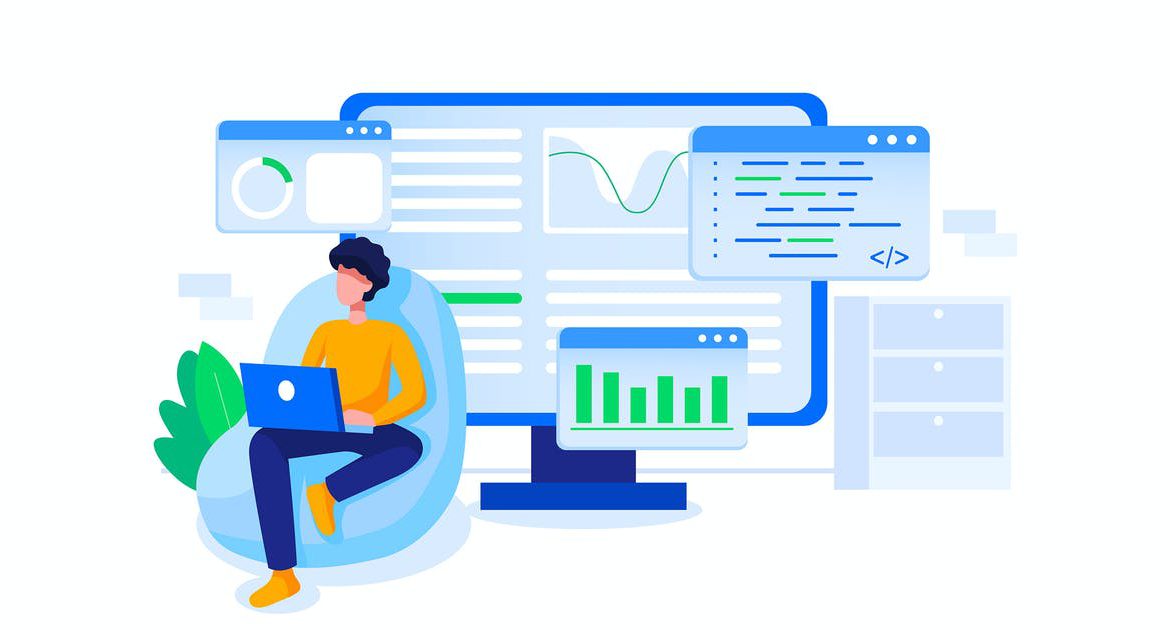You may think that your site’s web development job is finished after launching your website. You have done everything necessary to the best of your capacity. You’ve filled it with engaging content and effectively incorporated graphics in it and many more. In that case, can we say that your responsibility is over and you can just sit back and enjoy customers visiting your website?
Well, it would be great if it were so. Still, in reality, for websites to always run at total capacity and drive good traffic, maintenance is an inseparable part of the web development process. But what is website maintenance, what does it include, and why is it so important. Keep reading this article to figure it all out.
What Are Website Maintenance Services?
All the acts done to address the website’s issues and mistakes and keep it attractive and updated are referred to as website maintenance.
These services include :
- Scanning Your Website’s Security Vulnerabilities
- Checking Your Website’s Speed
- Keeping Your Blog Section Updated and Fresh
- Keeping Your Website Software and Plug-ins Up-to-date
- Checking Your Website Regularly so that It Has No Broken Links
- Keeping the Content Current and Relevant
- Website Analytics
- Backup Your Website Regularly
Now, let’s see what each of these items encompasses.
1-Scanning Your Website’s Security Vulnerabilities
First and foremost, you have to ensure that you have a proactive security strategy to keep your website safe against cyber-attacks and malware. This is doubly important if your website stores any form of customer information. So remember to install security patches to protect your website against hackers and malware.
2-Checking Your Website’s Speed
No matter what device your visitors use to access your website, it has to load as fast as possible. Why? Because if not, they just leave before even your engaging content gets to draw their attention. So how fast is considered quickly? Well, as a rule of thumb, your web pages should fully load in 3 seconds or less. Of course, the less, the better.
There are many tools to test your web page loading test. If it is not up to par, you can use these tips to enhance your web pages’ loading speed.
3-Keeping Your Blog Section Updated and Fresh
Try to feed your site’s blog section at least one new blog every week. Updating your site with informative, well-written blogs regularly not only demonstrates your expertise to your users and makes them revisit your site but also benefits your SEO as well. Fresh content draws the attention of Google spiders that index your site and gradually move you up in rankings due to it.
4-Keeping Your Website Software and Plug-ins Up-to-date
Never assume because your website is functioning; no risk threatens it. The updates are released to cover the previously known exploits. So, if you ignore the updates, you are jeopardizing your website. Besides, don’t forget that many of these updates are meant to enhance your website’s features and speed.
5-Checking Your Website Regularly so that It Has No Broken Links
Dead-end 404 errors leave a terrible impression on your website visitors and impact your SEO rankings negatively. Broken links happen due to a variety of reasons, like the destination website, permanently being removed. So, regularly check your site’s external links to ensure that your website is free of broken links.
6- Keeping the Content Current and Relevant
Your content can be relevant today but not in the next year when you already are not providing a particular service or how you provide it has changed. Moreover, sometimes the goods and services remain the same, but you figure out you can apply better keywords in your content to improve your SEO ranking. So make sure to update your content whenever you see the need.
7-Website Analytics
This step is very important because you can see how effective your efforts in the above items are. In addition, website analytics platforms allow you to understand your website visitors’ behaviors across the web pages. In other words, how many people have visited your website, which web pages they have seen, for how long they have stayed on each page, or whether or not they were led to your site through a link.
Such information tells you where you were successful and unsuccessful, so you know where to focus your efforts.
Performing Website Backup Regularly
It is not just the human errors that impose the risk of data loss on you your website. Sometimes, when you’re updating your website, something may simply go wrong. In other cases, despite scanning your website for security holes, hackers or malware can leak into those holes before you detect them.
However, performing backup depends very much on how your website was built and your hosting system. For example, you can use UpdraftPlus Plugin to perform a daily backup if you have a WordPress website. Anyway, no matter what web design and development platform your site is built on, essential data must be backed up at least once a week, if not every 24 hours.
Conclusion
We all know that the web development process never finishes by launching the website. Indeed, it requires maintenance to always remain at its best. Among the maintenance jobs are taking care of the website’s security, performing regular backups, keeping the blog section fresh and up-to-date.
Now I want to hear from you:
In your opinion, what are the other things that have to be done after launching a website? Leave your comment below.
Resources :
Bhagat, V. (2017, October, 25). 7 Useful Tips for Website Maintenance that You Must Know. PixelCrayons.
https://www.pixelcrayons.com/blog/7-useful-tips-for-website-maintenance-that-you-must-know/
What Is Website Maintenance and Why Is It so Important?. (n.d.). FINGERPRINT MARKETING. Retrieved July 17, 2021, from
https://fingerprintmarketing.com/website-maintenance/
FULLeSTOP. (2017, November 3). What should website maintenance include?
https://www.fullestop.com/blog/website-maintenance/
pairBlog. (2017, October 25). What To Do After You Build Your Website.
https://blog.pair.com/2017/10/25/what-to-do-after-creating-a-website/
PRIME MEDIA CONSULTING. (n.d.). What To DO Next After Building a Wesbite.
https://primemediaconsulting.com/what-to-do-next-after-building-a-website/
Craig, W. (n.d.). Things You Should Do Immediately After Launching a Website. Web FX.
https://www.webfx.com/blog/web-design/things-you-should-do-immediately-after-launching-a-website/
Gordiyenko, S. (2015, December 14). Website Development Process: Full Guide in 7 Steps. XB Software.
https://xbsoftware.com/blog/website-development-process-full-guide/
Shepherd, D. (n.d.). 7 Effective Ways to Improve Page Load Speed Right Now. TITAN GROWTH.
https://www.titangrowth.com/blog/improve-page-load-speed/
5 reasons why you need to update your blog regularly. (n.d.). the Proof Fairy. Retrieved July 17, 2021, from
http://www.theprooffairy.com/post/5-reasons-why-you-need-to-update-your-blog-regularly/
Warley, J. (2019, March 14). Broken Link Building: What Is It And Should You Be Doing It?. FRACTL.
https://blog.frac.tl/broken-link-building/
Ellice. (2019, February 6). 10 Reasons It’s Important to Perform a Website Backup. DreamHost.
https://www.dreamhost.com/blog/10-important-reasons-to-perform-website-backup/
Three of the most Important Website Maintenance Items. (n.d.). gravitate. Retrieved July 17, 2021, from
https://www.gravitatedesign.com/important-website-maintenance-items/
Kurtz, S. (2020, December 1). HOW OFTEN SHOULD YOU PERFORM A DATA BACKUP?. TOTAL IT.
https://totalit.com/how-often-should-you-perform-a-data-backup/





 by PurpleZ
by PurpleZ
Leave a Reply